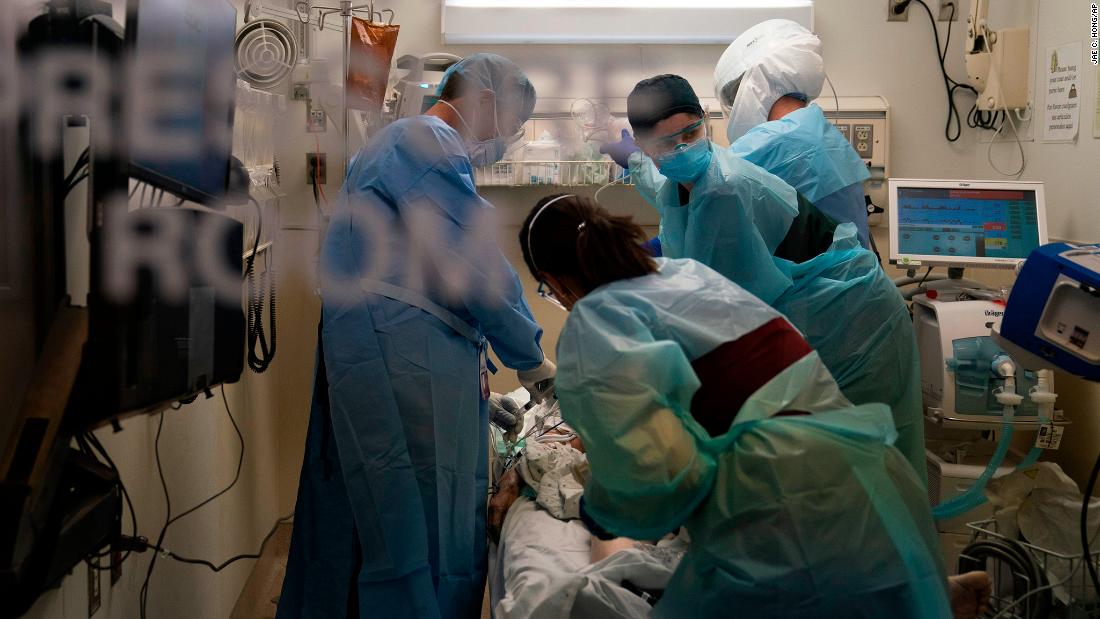
The US surpassed 80,000 daily hospitalizations on November 19 and set new records steadily for 17 days straight until Friday, according to the COVID Tracking Project. Then on Saturday, the number reached 91,635.
The spread of coronavirus has been climbing at concerning rates leading up to and just following the Thanksgiving holiday and could soon be getting worse due to holiday travel, experts say. As of Saturday, more than 13.2 million people have been infected by the virus and at least 266,047 people have died, according to data from Johns Hopkins University.
More than 4 million of the total cases of the pandemic have been reported in the month of November (about 30%), and more than 100,000 cases have been recorded every day for the last 26 consecutive days, JHU said.
Despite calls from officials and health experts to stay home, there was still an uptick in in travel the week of Thanksgiving. With weather getting colder and more people gathering indoors, experts have cautioned that the already climbing number of cases could get worse in the coming weeks.
"If anything, we are rounding the corner into a calamity," said Dr. Leana Wen, an emergency medicine physician and a visiting professor at George Washington University Milken Institute School of Public Health. "We're soon going to exceed well more than 2,000 deaths, maybe 3,000, 4,000 deaths every single day here in the US."
Los Angeles County under a 'concerning' spike
In Los Angeles County alone, at least 1,951 people were hospitalized on Saturday as health officials watch concerning increases in coronavirus metrics.
"The last time the county saw numbers this high at our hospitals was in August," Dr. Barbara Ferrer, Los Angeles County Public Health director, said Saturday.
The county saw "a small increase in deaths earlier this week," said Ferrer, but that increase is still concerning and highlights the importance of following stay-home orders.
"Even if you're not feeling sick, the simple act of gathering with people outside your household puts everyone at risk," according to Ferrer. "No amount of inspections or fines will replace individual compliance, people staying home, not gathering, wearing a face covering properly, and distancing," Ferrer emphasized.
"I understand everyone's frustration. We're headed into the holiday season and more than anything, we're all longing to spend time with our friends and family," she said.
And the number of cases is rising for healthcare workers -- particularly nurses in the area, Ferrer said.
When there is a surge, and there's more community transmission, healthcare workers have "double jeopardy," said Ferrer. "They have more jeopardy out in the community, and there are more patients at their jobs, and so they're treating many more people."
With the county at about 75% capacity for hospital beds already, residents disregarding precautions over holiday weekends could lead to "a surge on top of a surge," Ferrer said.
Strategizing how to get a vaccine to the public
While the best defense against the virus' spread is still following preventative measures, researchers and officials are working to get a vaccine out to the public.
Last week, Pfizer and BioNTech announced they had submitted an application to the US Food and Drug Administration for emergency use authorization for their Covid-19 vaccine candidate. US officials have previously expressed concerns about handling Pfizer's vaccine, which must be stored at extremely cold temperatures.
Meanwhile, the CDC's Advisory Committee on Immunization Practices has called an emergency meeting for Tuesday, where members will vote on which groups of people should get a Covid-19 vaccine first, once one is authorized.
"It is a significant advancement in the development and progression towards having a vaccine available," Rick Bright, a member of President-elect Joe Biden's coronavirus advisory board, said Friday.
The committee usually meets after a vaccine is authorized to make recommendations.
Fellow board member Dr. Celine Gounder told CNN that vaccinations may begin before 2021, which is in line with projections made by other health experts.
"People who are doing things that we really can't function without" should be some of the first to get vaccinated, Gounder said.
"Doctors, nurses who are caring for patients in the hospital, including patients with coronavirus, should very much be among those first receiving the vaccine," Gounder told CNN's Boris Sanchez on Saturday. "Beyond that, there are other frontline workers, essential workers, whether that's the people who are working in food and meat processing, people who are at the grocery store checkout counter."
People at higher risk of severe illness from coronavirus should also be considered for early vaccination, she said.
And while most adults will have access to vaccinations by next year, children may have to wait much longer, according to Dr. Esther Choo, professor of emergency medicine at Oregon Health & Science University.
"That's kind of a phase three thing most likely because children, for the most part, have been doing well in this pandemic," Choo told CNN's Amara Walker on Saturday. "They are on the list but we're going to try to focus on older folks and those with multiple comorbidities first."
COVID-19 - Latest - Google News
November 29, 2020 at 04:32PM
https://ift.tt/33ubKm6
More than 91,000 people -- the most of the pandemic -- are hospitalized with coronavirus in the US - CNN
COVID-19 - Latest - Google News
https://ift.tt/2VQ2gy8

No comments:
Post a Comment